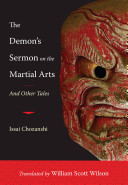home
current issue
featured poet
poem of the week
lives of the poets
poetry near you
reviews
archives
subscribe
donate
about us
contact us
The Demon’s Sermon on Martial Arts
reviewed by Lu Bianco
 The Demon’s Sermon on the Martial Arts
The Demon’s Sermon on the Martial Arts
Issai Chozanshi
Trans. Willian Scott Wilson
When I picked up The Demons Sermon on the Martial Arts I was intrigued. It’s a book from the early 1700’s written by a Samurai-philosopher under the pen name Issai Chozanshi. These old fighting books like The Art of War or The Book of Five Rings carry a lot of cache with men raised on Chuck Norris—guys who liked to punch through ends of 2 x 4’s in the garage. I notice that in memoirs and motivational seminars, lawyers and businessmen still tote SunTzu like they make killer decisions, same thing.
This book falls under the same mythic veil as the other martial arts books from a historical perspective. There is the Orient, traditional paintings, Samurai and the sword. What separates this from the others is that it focuses on the inward path instead of strategies or techniques: Clear you mind, cultivate chi, discover your path so you can move through the world with least resistance.
There is much wisdom to meditate on in these pages. There is poetry, contemporary ideas, and at times it makes you pause to digest a line and reflect on how it applies to your life: “The person who does not know himself does not know others.” The language is careful and ideas are long crafted. A great rainy Sunday read with hot green tea, when you’re reflective.
But some times the sermons are careless and brash: “The common man has not yet cut through the root of confusion of life and death. This always lies concealed and acts as a cover over the spirit.” For Chozanshi, a large part of ‘man’s’ inability to achieve self-fulfillment is founded in his fear of death. I don’t think this is an appropriate observation anymore. Lines like these make me want to walk back to the 1700’s and punch him right in the psyche.
These ideas make me conscious of how philosophies, not just religions, are antiquated vehicles that get handed on and are dangerous. In the words of Chozanshi “the crow that imitates the cormorant is going to drink (a lot of) water.” I hope no-one tries to appropriate these principles into a worldview. We are different birds than the Samurai of 18th century Japan. Society has evolved, our life experiences are psychologically more toxic. I’ve seen Samurai looking for crack on the sidewalks off Main Street. Chozanshi’s introverted approach to passing through life with ease is an unsalvageable relic. Still, there are a number of people who want to read this book so I’m going to pass it on.
A former world-ranked Olympic wrestler, Lu Bianco writes from Toronto.
This review first appeared in Pacific Rim Review of Books #20